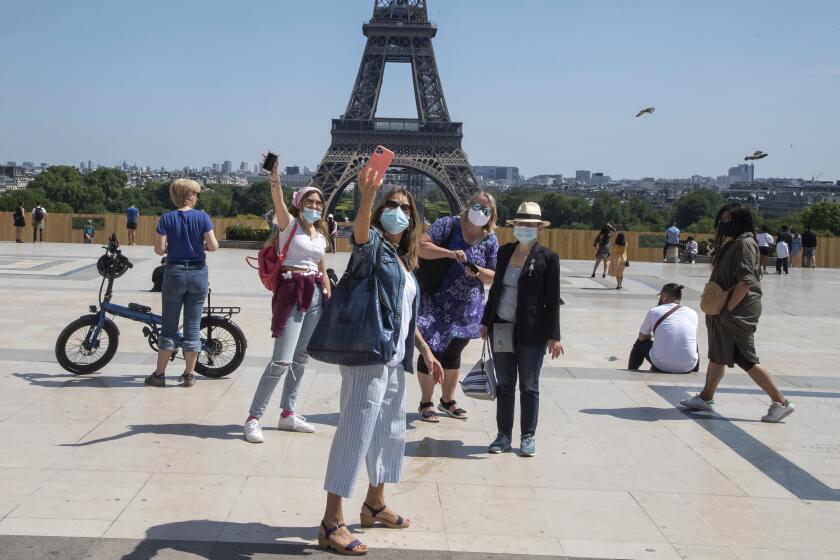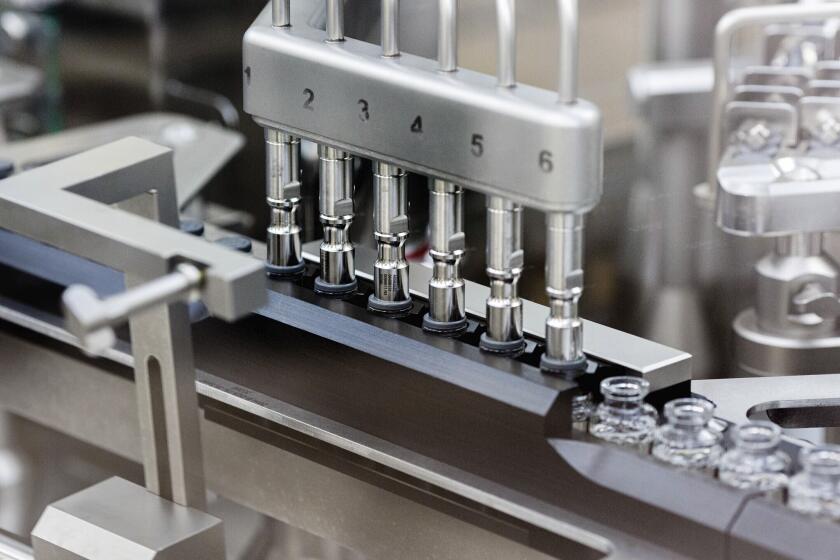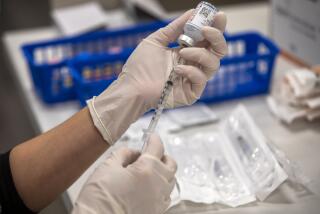Trump sets ambitious deadline for coronavirus vaccine

More than 130 labs around the world are working to develop a COVID-19 vaccine. But what would it take to vaccinate everyone by early next year?
- Share via
WASHINGTON — President Trump outlined an ambitious effort Friday to develop, produce and distribute a fully-approved COVID-19 vaccine by the end of the year, a timeline that even those in charge of the project acknowledge is highly unlikely.
Trump said the $10-billion program would have a goal of producing 300 million doses to administer to Americans by January.
Officials said the initiative would seek to streamline and coordinate the work of government agencies, private industry and the military. A former pharmaceutical executive and an Army four-star general will head the effort, which the White House called Operation Warp Speed.
“We’re looking to get it by the end of the year if we can,” Trump said in the Rose Garden. “Tremendous strides are being made.”
But Trump also hedged on the importance of the effort, declaring that America is already on the rebound from the coronavirus outbreak, which has killed about 87,000 Americans and cratered the economy.
“I want to make one thing clear — vaccine or no vaccine, we’re back,” he said. He repeated a claim he’s made since the first U.S. coronavirus cases were reported three months ago, that the virus will eventually “go away” on its own.
The Los Angeles Times will provide around-the-clock updates on COVID-19 from across Southern California and around the world.
“I don’t want people to think this is all dependent on a vaccine,” he said.
Public health officials worry about bringing a potential vaccine to market without several rounds of clinical trials to ensure that it is safe and effective.
The National Institutes of Health says one or two possible vaccine candidates could be ready for large-scale testing by July, with several others likely to follow. Elsewhere around the world, about a dozen vaccine candidates are teed up for small-scale testing or safety studies.
The tests are necessary to determine proper dosages and to avoid negative side effects. The process usually takes several years, but some of the world’s largest pharmaceutical companies are working with governments around the globe in an effort to speed up the search.
Dr. Amesh Adalja, an infectious diseases physician at Johns Hopkins Center for Health Security, said setting a deadline for a vaccine is “dangerous because you’re going to give people a false sense of hope and security.”
But he said it’s possible scientists can accelerate the usual timeline given changes in laboratory practices, including the use of “vaccine platform technologies” that allow researchers to test various candidates without developing each one from scratch, and the decision to prepare factories for mass production before officials know for certain that a particular vaccine will work.
“All of that’s going to shave time off, but everything has to go perfectly,” he said.
Dr. Jere W. McBride, an infectious diseases specialist at the Sealy Institute for Vaccine Sciences at the University of Texas, noted that no vaccine has been “developed that fast before.”
“Everything has to work and in science that’s often not the case,” he added. “Is it possible? Certainly.”
Coronavirus: There is a price to pay for pledging too much as the world anxiously awaits even a marginally effective therapeutic for the disease known as COVID-19.
Officials involved in the new initiative echoed the president’s optimism.
Moncef Slaoui, who was chairman of vaccines at British pharmaceutical giant GlaxoSmithKline until 2017, will lead the effort. He said early clinical trials have been encouraging.
“These data make me feel even more confident that we will be able to deliver a few hundred million doses of vaccine by the end of 2020,” Slaoui said. “And we will do the best we can.”
Gen. Gustave Perna, the commanding general of the Army’s Materiel Command, will serve as chief operational officer. He called the project “a herculean task,” but expressed confidence in its success.
“Winning matters and we will deliver by the end of this year a vaccine at scale,” said Defense Secretary Mark Esper.
Part of the effort involves using the military to boost production capacity before the vaccine is ready in order to expedite distribution when one is determined safe and reliable.
Dr. Stephen Hahn, the commissioner of the Food and Drug Administration, said Tuesday at a Senate hearing that his agency would evaluate about 10 vaccine candidates in early studies, and then select three to five to progress into larger studies in humans.
Dr. Rick Bright, the ousted former head of the government agency charged with developing vaccines, has cast doubt on the administration’s rush to find a vaccine.
“My concern is if we rush too quickly, and consider cutting out critical steps, we may not have a full assessment of the safety of that vaccine,” Bright told a House committee on Thursday. “So it’s still going to take some time.”
Trump’s comments in the Rose Garden were at times drowned out by loud horns from truckers parked near the White House who were protesting reduced shipping rates. Trump dismissed the din as a “sign of love” for him.
Dr. Deborah Birx, the White House coronavirus response coordinator, and Dr. Anthony Fauci, the government’s top immunologist, stood behind Trump but did not speak. Both wore face masks, although Trump did not.
More to Read
Get the L.A. Times Politics newsletter
Deeply reported insights into legislation, politics and policy from Sacramento, Washington and beyond. In your inbox twice per week.
You may occasionally receive promotional content from the Los Angeles Times.














